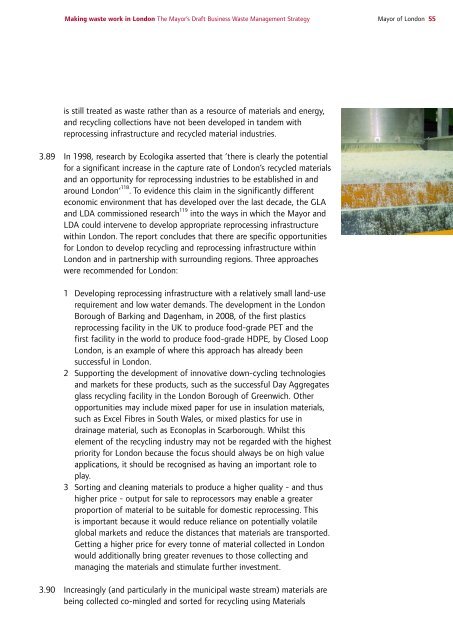Draft Business Waste Strategy PDF - london.gov.uk - Greater ...
Draft Business Waste Strategy PDF - london.gov.uk - Greater ...
Draft Business Waste Strategy PDF - london.gov.uk - Greater ...
Create successful ePaper yourself
Turn your PDF publications into a flip-book with our unique Google optimized e-Paper software.
Making waste work in London The Mayor’s <strong>Draft</strong> <strong>Business</strong> <strong>Waste</strong> Management <strong>Strategy</strong> Mayor of London 55<br />
is still treated as waste rather than as a resource of materials and energy,<br />
and recycling collections have not been developed in tandem with<br />
reprocessing infrastructure and recycled material industries.<br />
3.89 In 1998, research by Ecologika asserted that ’there is clearly the potential<br />
for a significant increase in the capture rate of London’s recycled materials<br />
and an opportunity for reprocessing industries to be established in and<br />
around London‘ 118 . To evidence this claim in the significantly different<br />
economic environment that has developed over the last decade, the GLA<br />
and LDA commissioned research 119 into the ways in which the Mayor and<br />
LDA could intervene to develop appropriate reprocessing infrastructure<br />
within London. The report concludes that there are specific opportunities<br />
for London to develop recycling and reprocessing infrastructure within<br />
London and in partnership with surrounding regions. Three approaches<br />
were recommended for London:<br />
1 Developing reprocessing infrastructure with a relatively small land-use<br />
requirement and low water demands. The development in the London<br />
Borough of Barking and Dagenham, in 2008, of the first plastics<br />
reprocessing facility in the UK to produce food-grade PET and the<br />
first facility in the world to produce food-grade HDPE, by Closed Loop<br />
London, is an example of where this approach has already been<br />
successful in London.<br />
2 Supporting the development of innovative down-cycling technologies<br />
and markets for these products, such as the successful Day Aggregates<br />
glass recycling facility in the London Borough of Greenwich. Other<br />
opportunities may include mixed paper for use in insulation materials,<br />
such as Excel Fibres in South Wales, or mixed plastics for use in<br />
drainage material, such as Econoplas in Scarborough. Whilst this<br />
element of the recycling industry may not be regarded with the highest<br />
priority for London because the focus should always be on high value<br />
applications, it should be recognised as having an important role to<br />
play.<br />
3 Sorting and cleaning materials to produce a higher quality - and thus<br />
higher price - output for sale to reprocessors may enable a greater<br />
proportion of material to be suitable for domestic reprocessing. This<br />
is important because it would reduce reliance on potentially volatile<br />
global markets and reduce the distances that materials are transported.<br />
Getting a higher price for every tonne of material collected in London<br />
would additionally bring greater revenues to those collecting and<br />
managing the materials and stimulate further investment.<br />
3.90 Increasingly (and particularly in the municipal waste stream) materials are<br />
being collected co-mingled and sorted for recycling using Materials
















